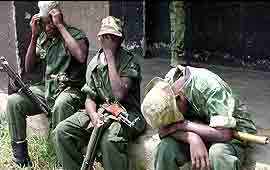Congo is an African Republic located in the heart of the continent, during the 19th century the Belgians took over this territory. The process of colonization of the African continent for the division of colonies by the Europeans took place in 1885, in Berlin, a German city, which hosted the conference.
At the Berlin Conference it was defined that the Congo would be explored by Belgium, but from the 19th century until the first decade of the 20th century, the personal possession belonged to the Belgian King Leopold II, and it was only after that date that the African country was made effective as Cologne.
Later, in the 50s, Congo revealed a nationalist guide named Patrice Lumumba, from his patriotic ideology started a process of struggle in search of the country's independence from the metropolis, in this case, Belgium, promoting a series of large-scale demonstrations with the support popular.
After many internal demonstrations in Congo, the Belgians decided to hand over the territory and soon after the country's independence was instituted. After this transition process, the first President was Joseph Kasavubu accompanied by the nationalist Prime Minister Lumumba.
However, the decolonization process did not guarantee peace in Congo, as soon after Moses Tshombe, who ruled a province called Katanga, put it in practice an initiative of a separatist character with the military support of Belgian troops, this with the help of financed resources coming from multinational companies that wanted Exploiting the mineral wealth present in the territory of Congo, to achieve the possibility of extraction, did not approve of nationalist ideologies and, worse still, socialist ones of Lumumba.
In view of the situation of pressure that the Republic of Congo was going through, the government asked for the help of the UN authorities, so peace forces were sent, however, they were not successful. The United States, fearing that socialist ideology would spread across the continent, raised a big boost to remove the socialist Lumumba from power, with pressure this leader was soon replaced by General Joseph Mobutu.
Shortly thereafter, Lumumba was arrested by the Katanga rebels and was assassinated in 1961. The country began to stabilize politically in 1964, when peacekeepers left the territory. The tranquility was short-lived as Tshombe attempted to seize power, sparking a new rebellion. One of the last changes was in 1971, in which the name was replaced.

